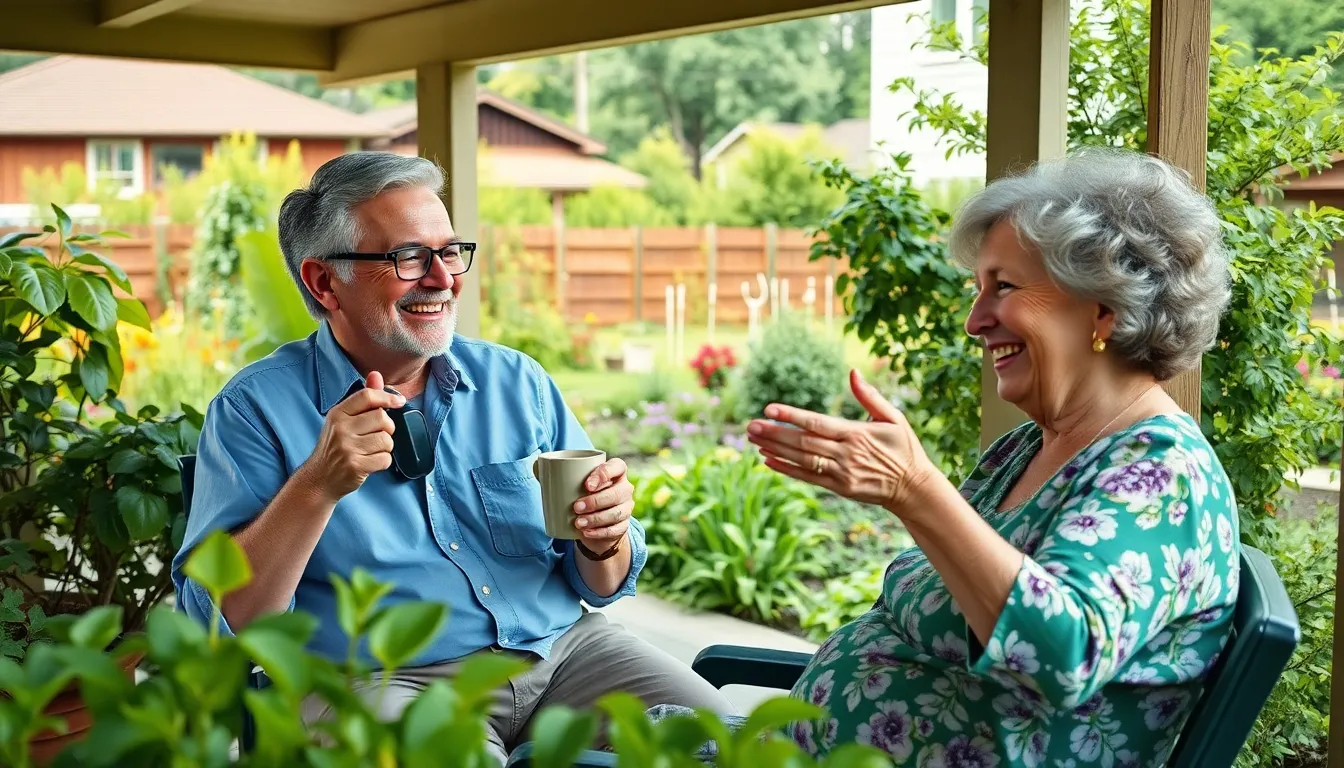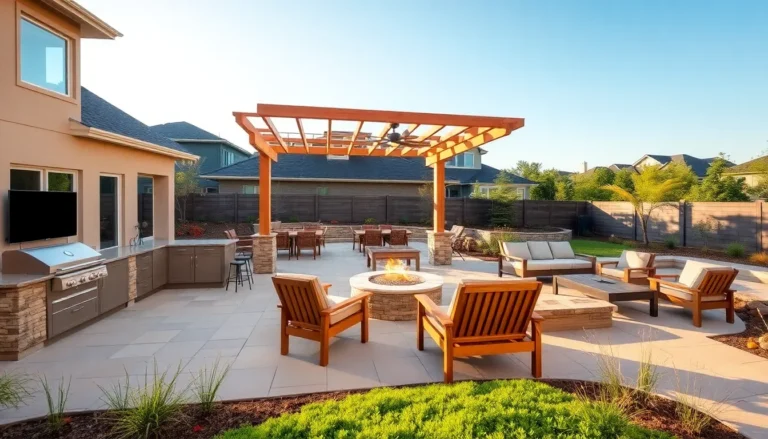Table of Contents
ToggleRetirement is often painted as a time for leisure and adventure, but for many, it comes with a big question: to rent or not to rent? Imagine trading the responsibilities of homeownership for the freedom of renting, where the only thing you need to fix is your golf swing. Renting in retirement can be a refreshing choice, allowing retirees to embrace a more flexible lifestyle without the burden of maintenance and unexpected roof repairs.
As they navigate this new chapter, retirees can find themselves in vibrant communities, surrounded by like-minded individuals. Renting offers the chance to downsize or even upsize without the commitment of a mortgage. So why not kick back, relax, and let someone else worry about the plumbing? It’s time to explore the benefits of renting in retirement and discover how it can lead to a more fulfilling, stress-free life.
Understanding Renting in Retirement
Renting offers retirees various advantages and considerations that can impact their lifestyle choices. Evaluating these factors helps in making informed decisions.
Benefits of Renting in Retirement
Renting provides retirees flexibility that homeownership does not. They can relocate easily for lifestyle changes or to be closer to family. Many rental properties come maintenance-free, allowing retirees to enjoy their leisure time without the burden of home repairs. Financially, renting may reduce costs associated with property taxes and insurance. Communities with rental options often offer social activities, fostering engagement and a sense of belonging. Neighborly interactions enhance overall quality of life, promoting wellness and happiness during retirement.
Challenges of Renting in Retirement
Renting comes with its own set of challenges that retirees must consider. Limited control over property modifications can frustrate those wanting personalized living spaces. Additionally, rental agreements may impose restrictions that affect lifestyle choices. Rent prices can fluctuate, impacting monthly budgets and financial planning. Some retirees face concerns about the availability of suitable properties in desired locations. Security and stability become paramount; long-term rentals aren’t always guaranteed, creating uncertainty about future housing arrangements. Understanding these challenges equips retirees to navigate the renting landscape effectively.
Choosing the Right Rental Property
Selecting a rental property in retirement involves various factors that impact lifestyle and comfort. Location and amenities play crucial roles in this decision.
Location Considerations
Proximity to essential services, social activities, and healthcare facilities significantly influences the choice of rental properties for retirees. Cities or neighborhoods with walking paths and parks enhance daily living. Access to public transport simplifies commuting and enables easy outings. Proximity to family members also fosters social connections, enhancing overall well-being. Retirees often prioritize locations with lower crime rates and a sense of community. Researching neighborhoods before deciding helps ensure that the environment aligns with personal preferences.
Amenities and Accessibility
When evaluating rental properties, amenities contribute to comfort and convenience. Many desirable options include fitness centers, swimming pools, or community lounges. Such features promote social interactions and healthy lifestyles, encouraging physical activities. Accessibility is equally important; properties should offer barrier-free designs and services for those with mobility challenges. Accessible public spaces and nearby recreational opportunities further enhance the living experience. Focusing on these aspects allows retirees to enjoy a fulfilling and stress-free lifestyle in their chosen community.
Financial Aspects of Renting
Renting in retirement involves several important financial considerations essential for making informed housing choices. Retirees must evaluate their financial situation in light of budgeting for rent and understanding lease agreements.
Budgeting for Rent
Setting a budget for rent is crucial for retirees. Identifying monthly income sources, such as pensions and Social Security benefits, helps in understanding the financial landscape. It’s advisable to allocate no more than 30% of monthly income to housing expenses. Consider additional costs associated with renting, such as utilities, parking, and renter’s insurance. Planning for the fluctuating nature of rent can prevent budget shortfalls. Exploring various rental options, including apartments and townhomes, provides flexibility in cost management.
Understanding Lease Agreements
Grasping lease agreements is vital for a smooth renting experience. Reviewing key terms like duration, rent amount, and rules regarding pet ownership assists in avoiding potential disputes. Understanding security deposits, which typically equal one month’s rent, and terms for their return prevents financial surprises. Knowing the implications of breaking a lease early, including potential penalties, is equally important. Enlisting legal assistance for clarification can prevent misinterpretations. Clear comprehension of lease terms fosters a positive rental relationship and ensures financial stability.
Alternatives to Renting
Retirees have several alternatives to consider outside of renting. These options can provide flexibility and address various lifestyle needs.
Downsizing and Selling
Downsizing can lead to significant financial and lifestyle benefits. Many retirees choose to sell their larger homes, freeing up equity for investments or travel. Smaller homes often reduce maintenance time and costs, enhancing leisure opportunities. Location also plays a crucial role; retirees seeking amenities prefer areas near social events and healthcare facilities. Choosing low-maintenance homes like condominiums or townhouses can offer additional comfort and convenience. Many sellers find that selling their current property allows for a simplified lifestyle, bringing peace of mind.
Co-housing and Shared Spaces
Co-housing arrangements appeal to retirees seeking community and shared resources. These setups foster social interaction and reduce living expenses through shared responsibilities. Many co-housing communities provide amenities such as garden spaces and shared activity centers, enhancing community involvement. Residents often enjoy a sense of togetherness, combating isolation common in retirement. Shared living not only promotes friendships but also helps with cost management, making it an attractive option for many retirees. Creating a supportive community network encourages a fulfilling lifestyle and enriches daily experiences.
Conclusion
Renting in retirement offers a unique blend of flexibility and convenience that can enhance one’s quality of life. By choosing to rent, retirees can embrace new experiences without the burdens of homeownership. This lifestyle allows them to focus on leisure activities and social connections while enjoying the benefits of maintenance-free living.
As they navigate their options, understanding the financial implications and the importance of location can lead to more satisfying choices. Whether it’s relocating for family or engaging in vibrant communities, renting provides retirees with the freedom to shape their retirement journey. Exploring these possibilities can ultimately lead to a more fulfilling and enriching retirement experience.








